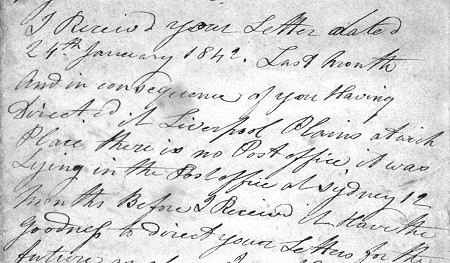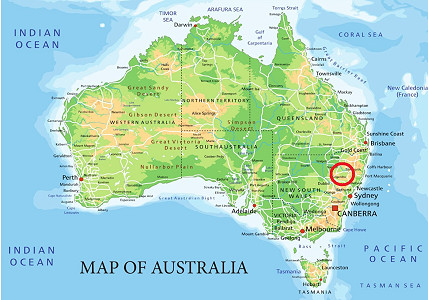Ishmael Croft’s letter

Extract from letter

Location of Liverpool Plains
Ishmael Croft, a labourer in the village of Alvingham, a few miles northeast of Louth, was convicted of burglary and transported to Australia in 1836. In August 1843, he wrote a letter to his father, which David Shucksmith kindly donated to Louth Museum.
Ishmael’s letter begins with a comment about the problems of long-distance communication in the nineteenth century: “I received your letter dated 24th January 1842 last month & in consequence of you having directed it to Liverpool Plains at which place there is no post office, it was lying in the post office at Sydney 12 months before I received it.
“I am happy to say that I have now saved thirty pounds to pay the expenses of my wife & child to the Colony. The time has nearly expired when they will be able to come out at the expense of the government, that is when I have served seven years in the Colony, about December next.
“A friend named Richard Wright is now free & worth about a thousand pounds. He keeps my little property for me & has promised to do so till I get free myself. My property consists of five cows and five calves, and the cows will calve again about Christmas.
“If my son Charles is a good hand, he will earn here from thirty to forty shillings a week. If he is industrious, he will soon realize a comfortable independence. I most earnestly advise him to lead a sober, steady and industrious life as he will find it much to his advantage hereafter.”
Alas, Ishmael’s elderly father died in October 1843, which was probably before he received this letter. Ishmael’s dreams for his wife and son to move to Australia did not materialise - by 1841, Ishmael’s wife Mary Ann was cohabiting with another man, and in 1848 son Charles Croft died in Louth when he was only 18 years old.
We know from Australian records that in March 1845 Ishmael was granted his Certificate of Freedom which meant that he could choose to continue in Australia as a settler or return home to England. He remained in Australia, where he died in 1858.